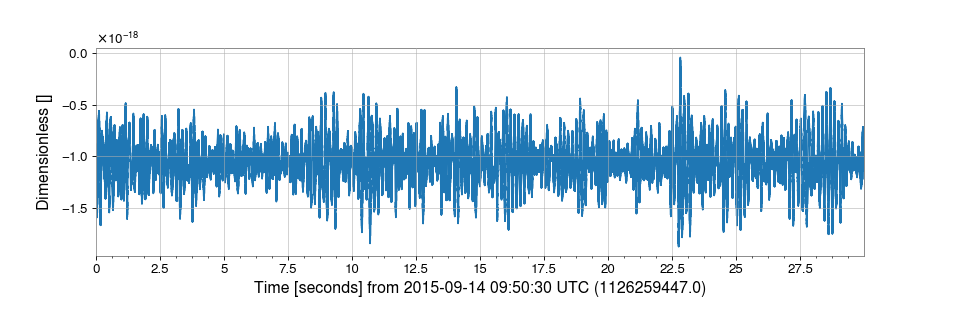Accessing Open Data from GWOSC¶
The Gravitational-Wave Open Science Center¶
The Gravitational-Wave Open Science Centre (GWOSC) provides strain data from gravitational-wave observatories for public use, including small datasets around each GW event detection, and bulk datasets covering entire observing epochs.
TimeSeries.fetch_open_data()¶
GWpy provides the TimeSeries.fetch_open_data() method as an interface
to the GWOSC data archive, requiring users to provide a minimum of
information in order to access data.
For example, to fetch 30 seconds of strain data around the first ever
gravitational-wave detection (GW150914), you need to give the prefix
of the relevant observatory ('H1' for the LIGO Hanford Observatory,
'L1' for LIGO Livingston), and the start and end times of your query.
We can use the gwosc Python package to query GWOSC itself for the
right central GPS time:
>>> from gwosc.datasets import event_gps
>>> gps = event_gps("GW150914")
>>> start = int(gps) - 15
>>> end = int(gps) + 15
Then we can call TimeSeries.fetch_open_data() to download the
calibrated GW strain data in that interval:
>>> from gwpy.timeseries import TimeSeries
>>> data = TimeSeries.fetch_open_data('L1', start, end)
We can then trivially plot these data:
>>> plot = data.plot()
>>> plot.show()
(png)

Plotting a TimeSeries
For more details on plotting a TimeSeries, see
Plotting time-domain data.
Note
TimeSeries.fetch_open_data() keywords
For more details on all of the available keyword options,
see the documentation of TimeSeries.fetch_open_data().
Accessing data from the Auxiliary Channel Three-hour Release¶
GWOSC has also published a data set containing instrumental sensor data
in a three-hour window around GW170814.
These data cannot be loaded using TimeSeries.fetch_open_data(),
but can be loaded using TimeSeries.get()
(or TimeSeriesDict.get()), by specifying host="losc-nds.ligo.org".
For more details, see TimeSeries.get().